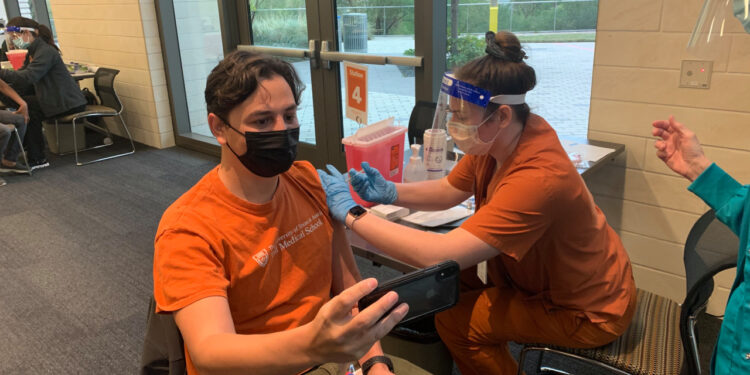AUSTIN (KXAN) — “It’s pretty incredible,” says Dr. Chris Moriates, Dell Medical School’s assistant dean, who is also a physician at the hospital.
UT Health Austin started distributing nearly 3,000 vials of the Pfizer COVID-19 vaccine on Tuesday.
“I felt a little emotional, honestly,” Moriates says just hours after getting his COVID-19 vaccine. “It’s something that seemed like it would be a long way off, so for it to be here now is really encouraging.”
It’s encouragement for him and his colleagues who have faced COVID-19 head-on. The University of Texas at Austin and UT Health Austin, the clinical practice of the Dell Medical School, say vaccine recipients include faculty members, staff and students who are actively involved with patients.
“I’ve seen how it ravages your body completely — every organ system in your body,” says Dr. Ryan Patrick Casey, an anesthesiologist at UT Dell Seton Medical Center.
Dr. Amy Young, chief clinical officer at UT Health Austin, says department heads worked together on a vaccination schedule to ensure people who work in the same area don’t get their shot on the same day.
“Everybody has a little bit of a side effect or body reaction, if you will, from a vaccine. Just like you would from flu vaccine or shingles vaccine and so we want to make sure we keep our health workforce strong and make sure we don’t take out a whole group of individuals that happen to have a body reaction and side effects,” Young said during a virtual press conference Tuesday.
She said data indicates side effects can be a little worse after the second dose.
“So, we’re actually having to think not only about today but three weeks from now when folks come back for the second vaccine,” Young said.
“I am certainly not fearful for having a little bit of a sore arm, or you know any other reaction that may happen because I know it could happen and it’s actually a sign that I’m creating antibodies protected from the virus,” Moriates says.
Vaccines will be distributed over nine days and are voluntary.
Dr. Young says if someone has had COVID-19 in the last 90 days, they can’t get a vaccine, yet.
The CDC says reinfection is uncommon during that period.
Credit: Source link


